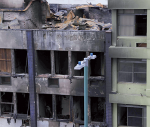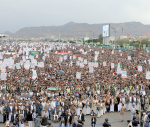You are here
Russia undermines Syrian opposition
Apr 26,2016 - Last updated at Apr 26,2016
It is not surprising that the Geneva peace talks on Syria are on the brink of collapse, following the opposition’s suspension of its participation and the regime’s refusal to discuss a transitional ruling authority with full powers.
From the outset it was clear that the Damascus delegation was not going to negotiate any proposal that would diminish the powers of President Bashar Assad or replace him entirely.
This is something that UN envoy Staffan de Mistura never acknowledged. All his efforts to extend the lifespan of the talks founder over this particular issue.
One reason the regime is playing hardball is that it feels it is no longer under international pressure to give in on any point.
The United has allowed Russia to lead on the issue of finding a political solution to the complex Syrian conflict.
President Barack Obama made clear this week that he does not favour a military intervention in Syria to topple Assad, nor is he supporting a proposal to establish safe zones for displaced people on Syrian territory.
His only goal now is to intensify military efforts to defeat Daesh; thus his decision to beef up Special Forces deployed in Syria.
And when it comes to Russia, its goals and objectives have little to do with reaching a political deal that would end Assad’s rule and allow the opposition to take over.
For one, Moscow would like to see the Riyadh-based Syrian opposition alliance, the High Negotiations Committee (HNC), weakened and replaced by the so called Moscow and Cairo opposition groups, which include Syria’s Kurds and individuals who are more willing to cooperate with the regime.
Discrediting the opposition alliance will derail the current round of talks.
Moscow continues to claim that the factions that make up the HNC include radical groups that are ideologically close to Al Nusra Front.
Meanwhile, the fragile truce has already crumbled, with the regime focusing its military operations on Aleppo and its surroundings.
Cutting off this important city from vital supply routes through Turkey will accelerate the process of its recapture. If and when this happens, the regime will emerge more confident that it can impose a de facto military solution.
Russia’s military support of the regime has not waned even after Moscow’s surprise decision, last March, to wind down its operations in Syria.
The break-up of the HNC will be seen as a major victory for the regime and its allies. If the opposition does not return to Geneva soon, internal divisions will spread and Moscow’s argument that other opposition groups are ready to replace it will be proven right.
The HNC’s choices are difficult; it will have to give up on one key condition, which is the fate of Assad, if it wants to remain relevant, but if it does just that, it risks imploding, which will allow Moscow to offer a replacement.
Even though Obama cast doubts over Russian President Vladimir Putin’s real intentions in Syria, he failed to offer his Arab and Western allies a clear view of what should be done to end the five-year civil war.
Washington’s commitment to supporting the so-called moderate rebel groups is being questioned, giving the Russian-backed regime forces the opportunity to retake additional territory in recent weeks.
For the HNC, the US position is baffling. While Washington says that there is no role for Assad in Syria’s future, its position is ambiguous over his function in the proposed transitional phase.
This is one reason the HNC is frustrated with the US and is suspicious of Washington’s understandings with Moscow on Syria.
And while the regime continues to enjoy Russian military support as it advances towards Aleppo, moderate rebel groups complain that they are severely under-equipped.
Again, US military support of opposition groups appears to have stopped altogether, in contrast to what it is giving to Syrian Kurds who are fighting Daesh.
With Russia dictating the pace of the political process while boosting the regime’s chances on the ground, it seems inevitable that the Geneva talks will shut down soon.
Moscow will blame the HNC and is likely to offer substitutes who are willing to accept a formula that does not exclude Assad and his regime from a political solution.
This is now the most likely scenario and it is not unlikely that Washington will tag along.
With the US abandoning the Syrian opposition, it is difficult to see how it can hold together politically.
Those who belong to armed groups like Jaish Al Islam and Ahrar Al Sham, will be targeted by the regime and Russian jets, and the areas they control will eventually be recaptured.
Moscow’s intervention in Syria, while criticised by the Americans, appears to be achieving its objectives for now. But the cost for the Syrian people will be devastating and, in the words of Tacitus, “they make desolation and they call it peace”.
The writer is a journalist and political commentator based in Amman.













